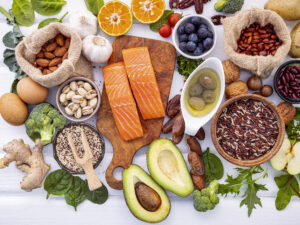Take control of PCOS and your diet
 You may wonder if there are things you can do to improve the symptoms caused by polycystic ovary syndrome. One thing you can focus on is PCOS and your diet. Eating a healthy, balanced diet can help with many of the problems associated with polycystic ovary syndrome, including obesity, metabolic syndrome, systemic inflammation and insulin resistance. It can also help you lower your risk of developing cardiovascular disease, diabetes and other chronic conditions associated with PCOS. Here’s some dietary advice from our San Antonio OBGYNs.
You may wonder if there are things you can do to improve the symptoms caused by polycystic ovary syndrome. One thing you can focus on is PCOS and your diet. Eating a healthy, balanced diet can help with many of the problems associated with polycystic ovary syndrome, including obesity, metabolic syndrome, systemic inflammation and insulin resistance. It can also help you lower your risk of developing cardiovascular disease, diabetes and other chronic conditions associated with PCOS. Here’s some dietary advice from our San Antonio OBGYNs.
How your diet affects insulin resistance and other problems associated with PCOS
When you eat a healthy diet based on non-starchy fruits and vegetables, whole grains, lean protein and low-fat dairy, it will have positive effects on your health. When you get control of PCOS and your diet, you can achieve many physical benefits.
- Lower your insulin resistance
- Lower the levels of androgens, or male hormones, in your body
- Help alleviate many of the physical symptoms associated with PCOS
- Potentially improve ovulation issues
- Improve your overall health
- Get to a healthy weight
- Improve your mood
Focusing on PCOS and your diet
A balanced approach to eating works better than trendy diets, which can actually be harmful to your health. One popular diet that works well for women with PCOS is the Mediterranean diet. Also, look at the MyPlate dietary guidelines from the U.S. Department of Agriculture for some good dietary advice. The goal is to eat healthy foods that balance carbs, proteins and fats, and to avoid inflammatory and starchy foods. Here are some good choices.
- Salmon or other fish rich in omega-3 fats
- Olive oil
- Protein-rich legumes or beans
- Non-starchy vegetables, such as peppers, broccoli, leafy greens, snow peas or tomatoes
- Whole grains, such as barley and brown rice
- Whole fruit
Foods to avoid if you have PCOS
When you focus on PCOS and your diet, you need to know which foods to avoid. You shouldn’t eat foods that increase inflammation. Our San Antonio OBGYNs suggest you limit or don’t consume the following.
- Saturated fats, including margarine and butter
- Fried foods
- Red meat
- Processed snack food
- Food high in sugar
- Prepared cereals, oatmeal and granola with a high sugar content
- Alcoholic beverages
- White rice
- Refined flour found in white bread, pasta, pizza crust
- Sugary beverages and sports drinks
Our San Antonio OBGYNs can provide guidance to help with your PCOS
Polycystic ovary syndrome requires expert medical management, diagnosis and treatment. Our experienced physicians have the expertise and skill to help you deal with PCOS. Contact us for an appointment and to learn more about PCOS and your diet.
